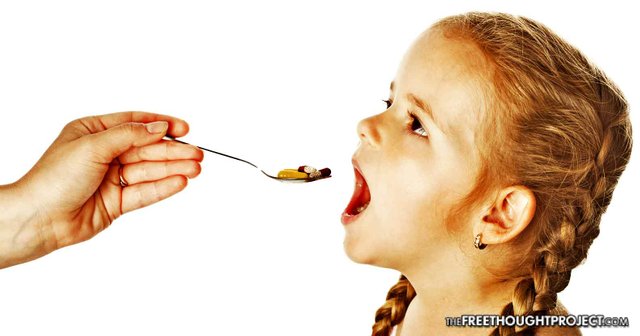
Big Pharma's subtle propaganda comes in many forms. Those tuning in to mainstream media programs will be subjected to nightly advertisements, many of which feature highly addictive and dangerous antidepressants. But a recent news story warning that 3-year-olds could be suffering from depression and should be evaluated by doctors shows that the industry will stop at nothing until all Americans are on drugs.
NBC's feature story on depression used scare tactics in its title to imply and suggest a national depression crisis among toddlers. "Generation at risk: America’s youngest facing mental health crisis," the title reads. While the nation is facing an opiate crisis caused by Big Pharma's highly addictive production and distribution of opiates, one would be hard-pressed to find many Americans who believe the nation's toddlers and children are mentally ill.
The article's authors are Kate Snow and Cynthia McFadden. They write:
The Centers for Disease Control and Prevention reports that 1 in 5 American children ages 3 through 17—about 15 million—have a diagnosable mental, emotional or behavioral disorder in a given year.Did you catch that? They are trying to convince readers that children as young as 3 years old suffer from mental illness. The article goes on to claim that the children simply need to be diagnosed in order to be treated, prompting readers with troubled children to consider taking their babies to psychiatrists or medical doctors.
Only 20 percent of these children are ever diagnosed and receive treatment; 80 percent — about 12 million — aren't receiving treatment.The article then uses an appeal to authority to convince its readers the facts are accurate. They write:
The only problem with their statistics is they come from an organization beholden to special interests, the Center for Disease Control. As The Free Thought Project has reported on numerous occasions, the CDC is rife with controversy and motivated by Big Pharma's demand for increased profits.Recent research indicates that serious depression is worsening in teens, especially girls, and the suicide rate among girls reached a 40-year high in 2015, according to a CDC report released in August.
It is no secret that it is a revolving door for those in the industry. In fact, Dr. Julie Gerberding, the former director of the Centers for Disease Control and Prevention, was named president of Merck & Co Inc’s vaccine division immediately following her 7-year stay in the government.
There have been 150 studies in seventeen countries on antidepressant-induced side effects. There have been 134 drug regulatory agency warnings from eleven countries and the EU warning about the dangerous side effects of antidepressants.
Despite this deadly laundry list of potential reactions to these medications, the use of antidepressants has skyrocketed by 400% since 1988.
Currently, 11 percent of all Americans 12 years of age and over take antidepressant medication, this is a higher rate than all other countries in the world.
While the skyrocketing use of psychiatric drugs in adults is certainly worrisome, the exponential increase of use in children is downright scary and the CDC has been approving this mass medication with no end in sight.
NBC coupled their statistics with a video segment of a single mother and her child, a three-year-old who a psychiatrist diagnosed with depression. The psychiatrist claimed children as young as three can be depressed if their symptoms are persistent, ongoing, and the child has no joy.
The NBC article quoted Dr. Harold Koplewicz—who is famous for advocating psychotropic drugs to children. Aside from being an outspoken advocate for the mass medicating of children, Koplewicz co-authored one of the most harmful studies to ever be published by GlaxoSmithKline which led to the deaths of countless children.
Aside from the known side-effects of antidepressants, there are incidents of the drug companies deliberately falsifying the safety data and allowing a known dangerous drug to be given to children. For years, GlaxoSmithKline was illegally persuading doctors to prescribe paroxetine, sold under the brand name Paxil, as an antidepressant for children and teenagers.
GSK used contrived data, known as Study 329—co-authored by Koplewicz—which was conducted and funded by the drug company and published in 2001, to convince the doctors to write scripts. The study made the claim that Paxil is "well tolerated and effective" for kids. Their bolstered claims worked, and in 2002 alone, doctors wrote two million Paxil prescriptions for children and adolescents.
However, a study published in the British Medical Journal found that not only was Paxil ineffective but it was causing grave side-effects such as self-harm and suicide.
In October 2011, GSK was sued by the United States Department of Justice for false claims and for a fraudulent scheme to deceive and defraud, and charged that the company for touted the study 329 and journal article "that it paid to have drafted and that exaggerated Paxil's efficacy while downplaying risks identified in one of the trials." In the summer of 2012, GSK settled the lawsuit with the DOJ for a record $3 billion (and more recently the State of North Carolina for $32 million).
This is who NBC is using to tell you that your kids need drugs.
Naturopaths generally believe otherwise. They are aware of what they call the "brain-gut connection." They often find in their practice of natural medicine that a person's brain (emotions, feelings, behaviors, personality) is directly affected by the food, nutrients and the body's ability to digest its fuel.
In a 2013 research study published by UCLA, scientists were able to definitively show the brain-gut connection in laboratory tests involving female subjects. They used probiotics (such as those found in yogurt) and brain scans to show how microbes in the gut affect the brain in a positive way. Those subjects who were in the control group and did not receive the probiotics showed no change in their brain function. According to Dr. Kirstin Tillisch:
Time and time again, we hear from patients that they never felt depressed or anxious until they started experiencing problems with their gut...Our study shows that the gut–brain connection is a two-way street.Could adding probiotics to one's diet, even the diets of children and babies, help individuals deal with mood swings better than taking a dangerous anti-depressant already known to cause children and young adults to commit suicide? Probably so, says Dr. Joseph Mercola.
Mercola is an osteopath, a medical doctor and proponent of natural medicine. He addresses the notion probiotics are the "new antidepressant" in a recent article where he looked at the mind-gut connection and how billions of microbes in our gut actually work to keep us mentally healthy.
Scientific advances now suggest your state of mind is influenced, if not largely directed, by the microflora in your gut, and probiotics (beneficial bacteria) are being thought of as "the new antidepressants." However, while it may be tempting to trade one pill for another, I urge you to consider taking a more comprehensive approach.He added a word of caution to anyone who thinks simply taking a probiotic will change everything and stave off depression. Mercola said there is more to it than just trading one pill for another, it involves making lifestyle changes to include healthy eating.
Taking a probiotic supplement may be helpful, but if you're still eating the same junk as before, it's not likely to make a significant difference. The key, really, is to eat a healthy diet. Limiting or eliminating sugar is absolutely essential, as adding healthy fats will provide your brain with much-needed fuel, while fermented foods will give you the beneficial bacteria you need.Mercola also said people must avoid a sedentary life. Together with eating healthy and activity, probiotics can treat depression. He concludes:
Add to that daily movement and regular exercise, good sleep and sensible sun exposure, and you're really giving your body the basic building blocks it needs for optimal performance — both physically and mentally. A probiotic supplement cannot achieve this all on its own. That said, studies have demonstrated just how important healthy gut bacteria are when it comes to treating depression.For parents struggling with a child who is temperamental, moody and possibly depressed, they should consider looking into how the child's environment, lifestyle, and diet are affecting his/her mood—before pursuing pharmaceutical drugs that come with dangerous side effects.
😍A very informative post. Great job. Keep it up! 😍

Downvoting a post can decrease pending rewards and make it less visible. Common reasons:
Submit